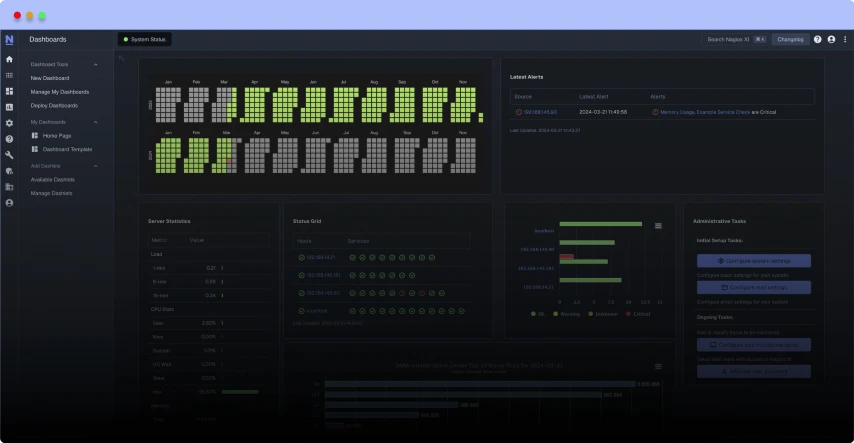Don’t miss your chance to attend the 2025 Nagios World Conference Sept 29th-Oct 2nd. Meet IT experts from around the world, increase your IT knowledge, up your monitoring game, hang out with the Nagios community, and enjoy great food and conversations in this exclusive event. Register now!
The Official Nagios Plugins Package is now part of the Core Services Platform (CSP) download.

The official Nagios Plugins package contains dozens of plugins to get you started monitoring all the basics in your infrastructure – including websites, Windows servers, Linux servers, network switches, network ports, services, applications, and system metrics like CPU utilization, load, and disk usage.
But the monitoring capabilities of Nagios aren’t limited to what’s offered by the official plugins. The worldwide Nagios community has developed thousands of plugins that allow you to monitor most everything you’ll find in your IT infrastructure.
The Nagios Core Services Platform (CSP) distribution includes:
Additionally, the Nagios CSP distribution includes additional useful addons and extensions for Nagios, including:
Click here to see what’s included in the Nagios CSP distribution.
Follow Nagios Plugins development, report bugs and issues, and get the latest code updates from the Nagios Plugins Github project.
Need to monitor EC2 instances, VMware, Hyper-V, databases like MySQL, DB2 or SQL Server, other pretty much anything else? You’re in luck because the Nagios community has developed thousands of Nagios plugins that monitor pretty much anything and everything you’ll find in today’s IT environment. Many of these community-developed plugins can be found on our Nagios Exchange site.
Expanding the monitoring capabilities of Nagios is easy through custom Nagios plugins that use a simple plugin architecture and API. Learn everything you need to write a custom Nagios plugin in Perl, Python, C/C++, or shell script easily with the following resources:
Watch presentations and tutorials on how to write custom plugins for Nagios on our Nagios Plugin Development playlist
Watch videos on writing and using custom Nagios plugins for monitoring a variety of IT infrastructure components on our Nagios Plugins Example playlist
Watch videos on how to manage and use custom plugins with Nagios on our Nagios Plugin Management playlist
Thousands of community-contributed, Open Source plugins can be found on the Nagios Exchange.
The following resources are important guides on how to write effective Nagios plugins quickly:
Search or browse the Nagios Exchange to find something that’s close to what you’re looking for and examine the source code to see how it’s written. That’s often the fastest way to learn how to write your own custom Nagios plugin.
Once you’ve written one or more of your own Nagios plugins, please consider submitting it to Nagios Exchange so that others may benefit from your work and the plugin’s capabilities. That’s how Open Source communities support each other and grow together!